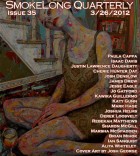Your story, “Lydia Before,” kind of blew my mind. It sucked me in and kept me reading to the end without me taking a breath. Well, maybe I did breathe a little, but it felt as if I was holding my breath. It was the voice that I loved right from the beginning. Can you talk a little about that voice? How do you get yourself in that place in your head that gets taken over by your character’s voice? How much of it is you? Or part of you?
Many of my best stories come from a prompt, and “Lydia Before” started from a writing challenge set by an online workshop group at ukauthors.com to write a story in which one character tells the truth and the other character tells lies. With that idea in mind, I started writing and the voice emerged. I wouldn’t say it was me (although all authorial voices contain a part of the writer, I’m sure!) but certainly it’s a mood that I recognize: smart, cutting, refusing to let anything get to you.
Denying what you are is always interesting in a character, I think; that idea has been behind quite a lot of my writing. In particular my second novel, Light Reading, is about an Armed Forces wife who refuses to deal with her difficult past, and so is unable to respond to events or form relationships in the present. I would say the voice of that character is quite similar to the narrator of “Lydia Before.”
I love the way you weave the theme of “facing the truth” in and out of “Lydia Before.” My awareness of the story’s intent begins with your opening line and slips into each paragraph the way the fish in your story swim in and out of seaweed. Your story is a terrific illustration of how to use language and structure to serve the theme. Is this conscious for you? What was your process in writing this piece?
The themes only emerge to me at the end of the first draft. A lot of the process is unconscious up to that point. Then I give it a few days, read it back, and the hard work starts. I change/sharpen voice, character, metaphor, pace, and lose whatever’s not working for the piece.
At the end of the first draft of “Lydia Before,” I had some confused elements regarding how much of Lydia’s past I wanted to reveal. In the end I decided that less was more. When dealing with a theme like buried truth, the most difficult element for me is in deciding what to leave unsaid. Writing “Lydia Before” has taught me something new—there doesn’t have to be a spoken resolution. It’s quite powerful to leave some things unresolved.
This story is just under 1000 words—996 to be exact—and I was wondering how word count helps or hinders your writing process and what other short-short fiction you write—nano, hint, micro?
I don’t set out to write to a word count and was pleased to find that “Lydia Before” ended up at just under a thousand words once I’d finished editing, so I knew it belonged in the flash fiction category! I have written shorter—back in 2004 I was a finalist in the Guardian’s Short Short Story Competition and the maximum word count there was 400. I like to really get to the core of the story and remove the unnecessary writing, so shorter fiction does suit me, but I also like the challenge of writing novels.
You’ve published a couple books and abandoned your blog. What’s next for Aliya Whiteley?
Yes, I’m blogless for the first time in years. I’m having a break until the end of the year and then I’ll be back in the blogosphere to publicize my first short story collection, so that’s very exciting.
Other than that, I’m working on my third novel at the moment. I should also mention that my first two novels were published under the Macmillan New Writing scheme, so I can still be found on the MNW blog sharing space with lots of talented writers. So I haven’t vanished utterly.



 The core workshop of SmokeLong Fitness is all in writing, so you can take part from anywhere at anytime. We are excited about creating a supportive, consistent and structured environment for flash writers to work on their craft in a community. We are thrilled and proud to say that our workshop participants have won, placed, or been listed in every major flash competition. Community works.
The core workshop of SmokeLong Fitness is all in writing, so you can take part from anywhere at anytime. We are excited about creating a supportive, consistent and structured environment for flash writers to work on their craft in a community. We are thrilled and proud to say that our workshop participants have won, placed, or been listed in every major flash competition. Community works.